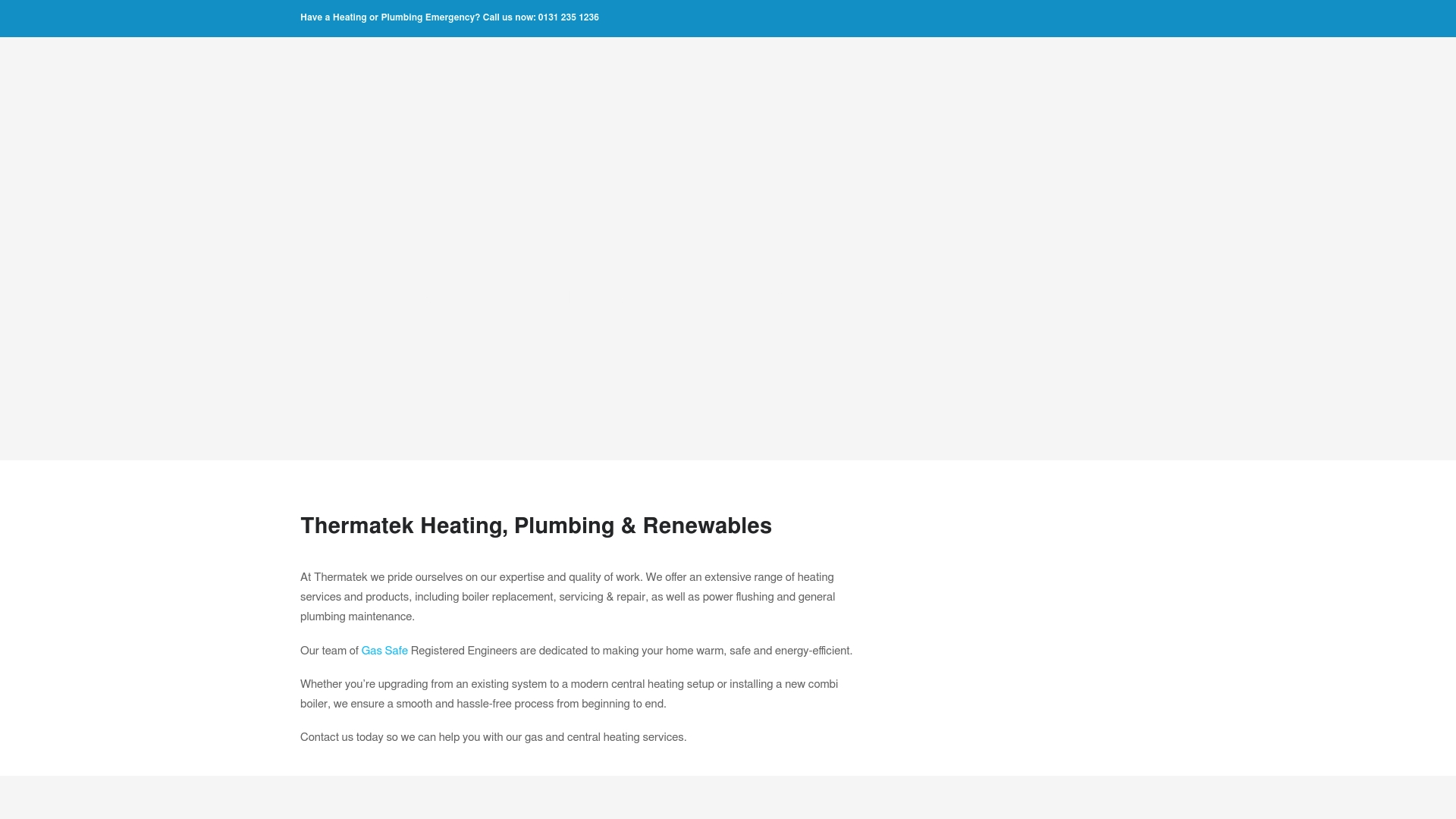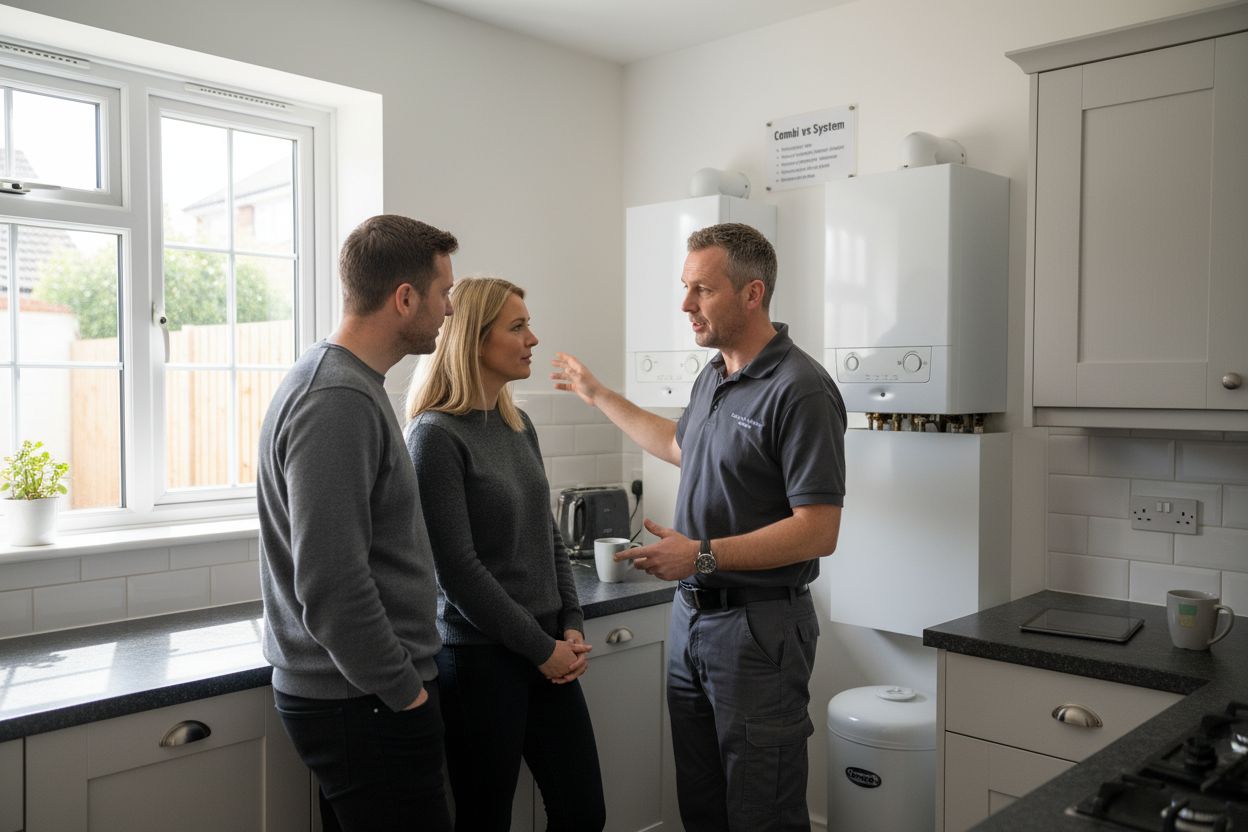Understanding the Difference Between Combi and System Boilers
Choosing the right boiler can make a huge difference at home, especially when you learn that a well-chosen boiler can cut heating bills by up to 30 percent every year. Most people think all you need to consider is heating power or brand. What actually matters even more is whether you pick a combi or system boiler, because this choice quietly shapes both your comfort and your budget far more than you might expect.
Table of Contents
- What Are Combi And System Boilers?
- Why Choosing The Right Boiler Matters For Your Home
- How Combi Boilers Function And Their Benefits
- How System Boilers Work And Their Advantages
- Comparing Combi And System Boilers: Key Differences
Quick Summary
| Takeaway | Explanation |
|---|---|
| Combi boilers are space-saving solutions | Ideal for smaller homes, combi boilers provide heating and hot water from a single compact unit without a separate storage tank. |
| System boilers suit larger households | They provide simultaneous hot water supply from a separate cylinder, making them perfect for homes with multiple bathrooms. |
| Choosing the right boiler impacts costs | The right boiler can reduce energy bills significantly, with efficient systems cutting heating costs by up to 30%. |
| Energy efficiency varies between types | Modern combi and system boilers can achieve over 90% efficiency, contrasting with older models that may operate at lower efficiency levels. |
| Installation complexity differs | Combi boilers are easier to install due to their integrated design, while system boilers require more space and a more complex setup. |
What are Combi and System Boilers?
Heating systems play a crucial role in maintaining comfort and efficiency in homes across the United Kingdom. Understanding the difference between combi and system boilers is essential for homeowners looking to make informed decisions about their heating infrastructure. System and combination boilers represent two distinct approaches to home heating, each with unique characteristics and benefits.
Combi Boilers: Compact and On-Demand
A combi (combination) boiler is a compact, all-in-one heating solution that provides both central heating and hot water directly from the main unit. Unlike traditional systems, combi boilers do not require a separate hot water cylinder or storage tank. When you turn on a hot water tap, the boiler instantly heats water as it passes through, delivering hot water on demand.
Key characteristics of combi boilers include:
- Compact size ideal for smaller properties
- Instant hot water without waiting
- No separate water storage required
- Generally more energy efficient
System Boilers: Storage and Flexibility
System boilers differ from combis by incorporating a separate hot water cylinder for storing heated water. This design allows for multiple hot water outlets to be used simultaneously, making them suitable for larger households with higher hot water demands. The boiler heats water which is then stored in an insulated cylinder, ready for use when needed.
Crucial considerations for system boilers include:
- Better performance in homes with multiple bathrooms
- Consistent hot water supply
- Compatibility with solar thermal systems
- Slightly more complex installation
Learn more about our boiler replacement services to understand which option might best suit your home’s specific heating requirements.
Why Choosing the Right Boiler Matters for Your Home
Selecting an appropriate heating system is far more than a simple purchasing decision. Energy experts emphasize that the right boiler can significantly impact your home’s comfort, energy efficiency, and long-term financial sustainability.
Financial Implications of Boiler Selection
The type of boiler you choose directly influences your household energy expenses. Inefficient boilers can waste substantial energy, leading to higher utility bills and unnecessary carbon emissions. A well-selected boiler can reduce annual heating costs by up to 30%, making the initial investment in the correct system a smart financial strategy.
Key financial considerations include:
- Upfront installation costs
- Ongoing energy consumption
- Potential maintenance expenses
- Long-term efficiency ratings
Energy Efficiency and Environmental Impact
Modern boilers are designed with advanced technologies that prioritize energy conservation. The right boiler not only keeps your home warm but also minimizes environmental footprint. Combi and system boilers have different efficiency profiles, with some models achieving over 90% energy efficiency compared to older systems that might operate at 60-70%.
Crucial performance factors to evaluate:
- Heat output matching your home’s requirements
- Water heating capacity
- Compatibility with existing heating infrastructure
- Potential for future renewable energy integration
Learn more about our annual boiler servicing to ensure your heating system maintains peak performance and efficiency throughout its lifecycle.
How Combi Boilers Function and Their Benefits
Combi boilers represent a sophisticated and efficient heating solution that has transformed residential heating across the United Kingdom. Modern heating technologies have made these compact units increasingly popular among homeowners seeking streamlined and energy-efficient heating systems.
The Working Mechanism of Combi Boilers
At the core of a combi boiler’s functionality is its ability to heat water instantaneously. When a hot water tap is turned on, cold water travels directly from the mains through the boiler’s heat exchanger. The boiler rapidly heats the water to the desired temperature, delivering hot water on demand without the need for a separate storage cylinder.
Key operational characteristics include:
- Direct water heating from mains supply
- Instantaneous hot water production
- Compact single-unit design
- No requirement for additional water storage tanks
Advantages of Choosing a Combi Boiler
The benefits of combi boilers extend far beyond their compact design. These systems offer significant advantages for modern households, particularly those with limited space or seeking maximum energy efficiency. By eliminating the need for a separate hot water cylinder, combi boilers reduce heat loss and minimize installation complexity.
Primary benefits homeowners experience:
- Reduced energy consumption
- Lower installation and maintenance costs
- Consistent hot water supply
- Space-saving design ideal for smaller properties
Explore our solar thermal systems to discover how you can further enhance your home’s energy efficiency alongside your combi boiler installation.
How System Boilers Work and Their Advantages
Heating system technologies have evolved significantly, with system boilers emerging as a robust solution for households requiring consistent and flexible hot water supply. These sophisticated heating units represent a powerful alternative to traditional heating configurations.
Operational Mechanics of System Boilers
System boilers operate through a distinctive process that separates water heating from central heating generation. The primary unit connects directly to a separate hot water cylinder, allowing for simultaneous heating of multiple water outlets. When activated, the boiler heats water which is then stored in an insulated cylinder, maintaining temperature and readiness for immediate use.
Key operational components include:
- Central boiler unit
- Separate hot water cylinder
- Advanced heat exchanger
- Integrated pump system
Comprehensive Advantages for Modern Homes
Unlike combi boilers, system boilers provide exceptional flexibility for households with higher hot water demands. They excel in environments with multiple bathrooms or significant simultaneous water usage. The separate cylinder allows for storing larger quantities of hot water, ensuring consistent supply even during peak usage periods.

Notable system boiler advantages:
- Support for multiple simultaneous hot water outlets
- Compatible with renewable energy technologies
- Superior performance in larger households
- Enhanced water pressure across different taps
Check out our latest heating news to stay informed about emerging heating technologies and system boiler innovations.
Comparing Combi and System Boilers: Key Differences
Heating system technologies reveal distinct characteristics that make combi and system boilers unique solutions for different household needs. Understanding these fundamental differences helps homeowners make informed decisions about their heating infrastructure.
To help clarify the fundamental differences between combi and system boilers, the following table compares key features, advantages, and suitability for each type.
| Feature / Aspect | Combi Boiler | System Boiler |
|---|---|---|
| Space Requirements | Compact, single unit; ideal for smaller homes | Requires separate cylinder; needs more installation space |
| Hot Water Supply | Instant, on-demand; no storage tank | Stored hot water in separate cylinder; supports multiple outlets |
| Installation Complexity | Easier and quicker to install | More complex due to additional components |
| Suitable Household Size | Smaller homes with fewer bathrooms | Larger homes; multiple bathrooms and higher demand |
| Energy Efficiency | High; minimal heat loss | High; may lose heat from cylinder if poorly insulated |
| Water Pressure | Good with strong mains pressure | Consistent, even with multiple taps running |
| Compatibility with Renewables | Limited (solar preheat possible) | Good; can integrate with solar thermal systems |
Structural and Design Variations
Combi boilers are compact, integrated units that provide heating and hot water directly from a single source. In contrast, system boilers feature a separate hot water cylinder, creating a more complex but versatile heating setup. The primary structural difference lies in their water storage and delivery mechanisms.

Key structural distinctions include:
- Combi boilers: Single compact unit
- System boilers: Separate boiler and cylinder configuration
- Different water heating and storage approaches
- Varying installation space requirements
Performance and Suitability Factors
The performance of each boiler type depends significantly on household characteristics. Combi boilers excel in smaller properties with lower simultaneous hot water demands, while system boilers are ideal for larger homes with multiple bathrooms and higher water consumption needs. Water pressure and flow rate differ substantially between these systems.
Critical performance considerations:
- Combi boilers: Instant hot water, limited simultaneous outlet use
- System boilers: Multiple outlet support, consistent water pressure
- Energy efficiency variations
- Compatibility with different property sizes
Learn more about our boiler replacement services to determine the most suitable heating solution for your specific home requirements.
Ready for the Right Boiler Choice? Thermatek Guides You
Selecting between a combi and a system boiler is not just about convenience. It is about ensuring comfort, reliability, and savings for your home. If you have wondered whether your household demands instant hot water or consistent flow for multiple showers, you are not alone. Many Edinburgh and Midlothian homeowners feel uncertain about matching their heating needs with the right solution. The decision affects not only warmth and water pressure but also your long-term energy bills and carbon footprint. With so much at stake, professional guidance can make all the difference.

Let our Gas Safe Registered experts assess your individual requirements and help you decide with complete confidence. We specialise in all aspects of boiler replacements and upgrades as well as ongoing boiler servicing to keep your system running safely and efficiently. Choose peace of mind with Thermatek’s trusted local service and see what makes us the first choice for heating in Edinburgh and Midlothian. Visit Thermatek Heating and request your free quote or consultation today. Do not put off comfort and savings any longer.
Frequently Asked Questions
What is the main difference between combi and system boilers?
Combi boilers are compact units that provide both heating and hot water directly from a single source, while system boilers use a separate hot water cylinder for storing heated water, allowing for multiple hot water outlets to be used simultaneously.
How do combi boilers work to provide hot water?
Combi boilers heat water instantaneously as it flows through the unit. When a hot water tap is turned on, cold water from the mains passes through the boiler’s heat exchanger and is heated to the desired temperature without the need for a storage tank.
What are the benefits of a system boiler?
System boilers provide a consistent hot water supply and are suitable for larger households with higher hot water demands, as they can store heated water in a cylinder and supply multiple outlets at once.
Which type of boiler is more energy efficient?
Combi boilers tend to be more energy efficient due to their compact design and the absence of a separate storage tank, which reduces heat loss. However, selecting the right type depends on your household’s specific hot water and heating needs.

